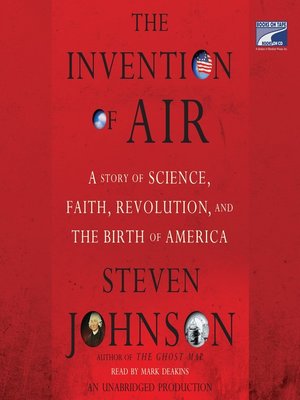The Invention of Air
audiobook (Unabridged) ∣ A Story of Science, Faith, Revolution, and the Birth of America
By Steven Johnson

Sign up to save your library
With an OverDrive account, you can save your favorite libraries for at-a-glance information about availability. Find out more about OverDrive accounts.
Find this title in Libby, the library reading app by OverDrive.



Search for a digital library with this title
Title found at these libraries:
| Library Name | Distance |
|---|---|
| Loading... |
The Invention of Air is a story of sweeping historical transformation, of genius and friendship, violence and world-changing ideas, that boldly recasts our understanding of the most significant events in our history.
It centers on the story of Joseph Priestley–scientist and minister, protégé of Benjamin Franklin, friend of Thomas Jefferson–an eighteenth-century radical thinker who played key roles in the invention of ecosystem science, the discovery of oxygen, the founding of the Unitarian Church, and the intellectual development of the United States. Priestley represented a unique synthesis: by the 1780s, he had established himself as one of the world’s most celebrated scientists, most prominent religious figures, and most outspoken political thinkers. Yet he would also become one of the most hated men in all of his native England. When an angry mob burned down his house in Birmingham, Priestley and his family set sail for Pennsylvania.
In the nascent United States, Priestley hoped to find the freedom to bridge the disciplines that had governed his life, to find a quiet lab and a receptive pulpit. Once he arrived, as a result of his close relationships with the Founding Fathers Priestley found himself at the center of what would go down as one of the seminal debates in American history.
As in his most recent bestselling work, The Ghost Map, Steven Johnson here uses a dramatic historical story to explore themes that have long engaged him: innovation and the way new ideas emerge and spread, and the environments that foster these breakthroughs.
It centers on the story of Joseph Priestley–scientist and minister, protégé of Benjamin Franklin, friend of Thomas Jefferson–an eighteenth-century radical thinker who played key roles in the invention of ecosystem science, the discovery of oxygen, the founding of the Unitarian Church, and the intellectual development of the United States. Priestley represented a unique synthesis: by the 1780s, he had established himself as one of the world’s most celebrated scientists, most prominent religious figures, and most outspoken political thinkers. Yet he would also become one of the most hated men in all of his native England. When an angry mob burned down his house in Birmingham, Priestley and his family set sail for Pennsylvania.
In the nascent United States, Priestley hoped to find the freedom to bridge the disciplines that had governed his life, to find a quiet lab and a receptive pulpit. Once he arrived, as a result of his close relationships with the Founding Fathers Priestley found himself at the center of what would go down as one of the seminal debates in American history.
As in his most recent bestselling work, The Ghost Map, Steven Johnson here uses a dramatic historical story to explore themes that have long engaged him: innovation and the way new ideas emerge and spread, and the environments that foster these breakthroughs.







